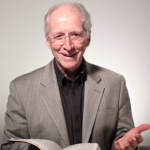Dr. James White: Double Standards – A Response to Ijaz Ahmad on John 9:38, 20:28
A very important discussion of textual criticism in response to this Islamic attempt to demonstrate New Testament unreliability.

 As a Pastor, Did You Use Church Growth Strategies? – Interview with John Piper (original source in your time as a pastor at Bethlehem Baptist Church, over all those 30+ years, did you ever use strategies aimed at church growth? How would you counsel pastors and churches who seek to grow numerically and reach more people, while doing so in the most biblical and faithful way possible?”
As a Pastor, Did You Use Church Growth Strategies? – Interview with John Piper (original source in your time as a pastor at Bethlehem Baptist Church, over all those 30+ years, did you ever use strategies aimed at church growth? How would you counsel pastors and churches who seek to grow numerically and reach more people, while doing so in the most biblical and faithful way possible?”
I am really happy for this question, because I don’t think we have tackled this in any of all the 900, plus. I tried to communicate to our people continually that, in view of the glory of Christ, his purpose is to be magnified in the world through believing people, the vast lostness of millions and millions of people near and far, the horrors of hell, the beauties and the power of the gospel, the nature of love, the truth that it is more blessed to give than to receive. I tried to communicate in view of all that, not rescuing perishing people is not an option for us. It is also not possible for us since only God can raise the dead and open the eyes of the blind and take out stony hearts of unbelief.
So, our first strategy of growth was prayer. I tried to create a culture of desperation for all the things that matter most, which are the ones that only God can do. Parents can’t do it. Evangelists can’t do it. Pastors can’t do it. Friends can’t do it. We scatter prayer meetings all through the week, besides encouraging families and small groups to pray and individuals, of course, to pray for the impossible goal of getting sinners through the eye of a needle, which only God can do that miracle.
We also knew, however, that faith comes by hearing. So, not sharing the gospel with a view to seeing people believe and be saved and be part of God’s family forever was not an option for us. The term “church growth,” however, had connotations for us that were not so good. At least in the circles in which I function and my people, so much depends on where the accent falls when you talk about church growth. Abuses of pragmatism, minimization of theology, dilution of the gospel, dumbing down of serious, joyful worship in a way that came to be known as seeker-sensitive, all these things were associated in our language with the church growth movement. Which is sad because there is nothing wrong with growing. In fact, I wanted to say: We must pursue growth.
But in that context, my suggestion to pastors is that you use biblical language constantly to permeate your people’s minds with something other than catchphrases that are in seminars like “church growth.” The great challenge is not to become a bigger and bigger church, but to see more and more people escape the wrath of God. Ask your people that. If they say: Oh, I don’t know if that church growth stuff is biblical, say: How about escaping wrath? Is that good? So, you put in categories like that.
Once our people believed in that, ultimately it didn’t matter whether the people who escaped wrath through faith in Jesus went to our church or not. That is quite secondary. What ultimately mattered was: In every community, are people hearing the gospel? Are they believing? Are they escaping the wrath of God? Are they getting full of the Holy Spirit? Are they participating in biblical churches? It is not about our particular church getting bigger and bigger. And when the people understand church growth in those categories, then, I think, a pastor can say, which I did: Not growing is not an option for us. They knew what I meant when I said that, at least if you live in a metropolitan area with several hundred thousand unbelievers, that is true. You might live in a small town where everybody is lined up somewhere, and growth is not a very big possibility. But if you live in the Twin Cities or in any place where you have a few thousand unbelievers, you can talk like that.
This can be, however — and here is a great obstacle — this can be very unsettling for a church. There are a lot of people, shame on them, for whom they are just happy with these 50 people. And they are happy with these 150. And they are happy with these 350. Or they are happy with these 500 and, frankly, they don’t like all these strange faces around here. It is just not as comfortable here as it used to be when we all knew each other. Continue reading
 Article by Nicholas Davis – 12 Things the Apostles’ Creed Teaches Us (original source here)
Article by Nicholas Davis – 12 Things the Apostles’ Creed Teaches Us (original source here)
The Apostles’ Creed has been used by Christians around the world since the fourth century. Even though it was not written by the original twelve apostles, every single line in the creed was taught by the apostles and earliest disciples of Jesus. The twelve things the Apostles’ Creed emphasizes are twelve important things we learn about Christianity in the New Testament:
1. God is not only our powerful Creator but is also our caring Father.
The first article gives us confidence in the power of God because all creatures are dependent on him for existence. It also gives us confidence in the love of God: no creature can separate us from our faithful Father.
2. Jesus Christ is our Lord.
The second article reminds us that we are not our own but belong to Jesus who has made us his own. “My Lord and my God!” is the proper confession of a Christian (John 20:28–29). Whether we acknowledge his lordship or not, in heaven and on earth and under the earth, and every tongue confess that Jesus Christ is Lord, to the glory of God the Father” (Phil. 2:10–11). What this confession means for us is that Christ’s reign and rule over us topples every other idol and god—he has saved us from bondage to the world, the flesh, and the devil. We are not our own but belong to Jesus.
3. Jesus was miraculously conceived by the Holy Spirit through Mary.
This third article is important because Jesus’ innocence from conception to the end of his life is what covers all of our sins. Since he was conceived, was born, and lived like us in every respect, yet without sin (Heb. 4:15; 7:26, 27), he is able to redeem us from the curse of God’s holy law. Unlike you and me, and every other person born after the Fall (Gen. 3), Jesus was sinless from conception and birth.
4. Jesus suffered, was crucified by the Romans in the first century, and died.
In this fourth article, we confess that Jesus lived the perfect life and died the death that we deserved in order to save us from the wrath of God. In addition, we are reminded that the Christian faith is a historic faith—Jesus lived and died at the same time that Pontius Pilate, an obscure Roman governor, was ruling. This is not myth or fairytale—Christianity is a faith founded on facts.
5. Jesus rose from the dead.
This fifth article teaches us that by his resurrection Jesus overcame death so that he could make us partakers in his death and resurrection. His resurrection from the dead is a pledge to us that we too will be raised from the dead as he was.
6. Jesus ascended into heaven and is exalted.
In this sixth article, we affirm that Jesus is now our Advocate in heaven before our Father, pleading and interceding on our behalf and for our sake. When he ascended, Jesus also poured out his Spirit upon us, his church, gifting us with a down payment of what is to come.
7. Jesus will return in judgment.
This seventh article is an especially great comfort to those who are suffering and who face persecution. We affirm that Jesus will come to make every wrong right and that his war will be the war to end all wars. All of his people will then enter into glory and have everlasting joy and life.
8. The Holy Spirit is a person of the Holy Trinity.
The eighth article reminds us that the Holy Spirit is a person in the Godhead, just as the Son is God and the Father is God. We are also comforted by the fact that the Holy Spirit unites us to Jesus Christ who is in heaven, and makes us more and more like him each day, and especially on Sunday as we gather to hear the Word preached and partake in the Lord’s Supper.
9. The church is universal.
This ninth article reminds us that since the beginning of time, God has always gathered, defended, and preserved for himself his church. It spans across all ages and in many different places, and it is in this church that all Christians belong.
10. There is a fellowship of Christians across all times and places.
The tenth article concerns the communion of saints. We do not only belong to Jesus Christ, but we belong to one another—to all who share the name of the Triune God and call on the name of Jesus. Since we belong to one another, we should readily share our gifts and any abundance we have with those in need to bless and further Christ’s church on this earth.
11. Our sins are truly and really forgiven in Christ.
The eleventh article is perhaps the sweetest of them all. Because of what Jesus has done for us in his life, death, resurrection, and ascension, God will no longer remember our sins. To all of you who believe in Jesus Christ alone, you are no longer under condemnation.
12. Our bodies will be resurrected. Heaven is real.
The twelfth article finishes with a strong emphasis on the reality of our bodily resurrection. Too often we tend to think of the spiritual life as exclusively soul-related, but it also includes the body. Further, there is no greater comfort than to know that in Christ we soon will be in total possession of perfect blessedness—such that no eye has seen, nor ear heard, nor the heart of man imagined. Heaven is for real, and we will be with the Triune God.